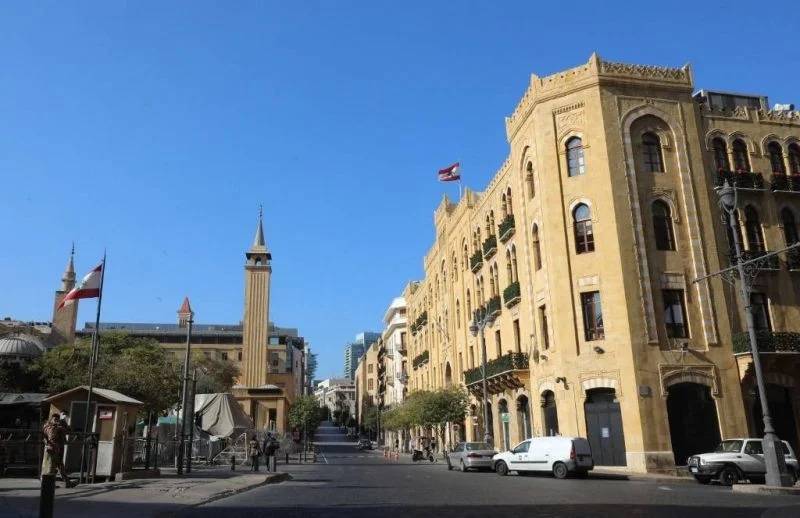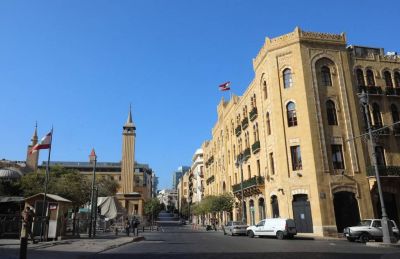
The seat of the municipality of Beirut (right), in Downtown, Beirut. (Credit: Anwar Amro/AFP)
While political polarization in the country is on full display, a bill risks plunging Lebanon into a new controversy.
Presented July 15 by the Aounist MPs Nicolas Sehnaoui (Beirut I), Edgar Traboulsi (Beirut II) and Caesar Abi Khalil (Chouf-Aley), the law 1156/2022 aims to divide the capital into two municipalities.
The first, Beirut I, would include the neighborhoods of Ashrafieh, Rmeil, Medawar, Saifi and the port district (Marfaa), and would therefore be predominantly Christian.
Beirut II would be predominantly Sunni, since it would include the neighborhoods of Ain al-Mreisseh, Mina al-Hosn, Ras Beirut, Zokak al-Blat, Bachoura, Mazraa and Mousseitbeh.
According to the text viewed by L’Orient-Le Jour, the proposed law stems from the development “imbalance” between the different neighborhoods of Beirut and the desire to apply a decentralized model of governance, especially since the capital is becoming increasingly populated.
Under the model proposed, the two municipalities would hold monthly inter-municipal meetings to discuss common challenges.
According to the text, each municipality will be responsible for its own treasury and tax collection, but a common fund will be set up to finance intermunicipal projects.
“The trauma resulting from the Beirut port explosion is behind the need to [create] such a law,” Sehnaoui told L’Orient-Le Jour.
“The municipality of Beirut was totally absent in terms of disaster relief. An aid package of LL30 billion was approved by the city council, but the funds were never distributed,” he added.
Sehnaoui continued, “Reducing the size of each municipality makes governance easier, and accountability in municipal elections more concrete.”
Confessional federation
Not everyone, however, shares the same view.
“Behind Beirut I and Beirut II hide East Beirut and West Beirut,” Waddah Sadek, a Sunni MP from Beirut affiliated with the protest movement, told L’Orient-Le Jour.
Although adopted during the legislative elections, this division of the capital is reminiscent of the years of the 1975-90 Civil War during which the eastern part of Beirut was controlled by Christian militias and the western part of the city was controlled by Palestinian militias and their allies in Lebanon.
The “green line” that separated the two sides of the city was known for its danger and the violence of the fighting that took place along it.
“We will fight with all our strength against this project, which takes us back 30 years,” Sadek said.
An elected MP from the Amal Movement also decried the proposed law.
“This is a dangerous first step, which could encourage other multi-faith regions to follow suit. It would lead us to a confessional federation,” said the MP who is close to Parliament head Nabih Berri.
He, however, added that nothing prevents the proposal from being studied and debated in Parliament.
“This proposed law is far from being motivated by religious considerations. On the contrary, the only objective is to promote the development of Beirut’s neighborhoods while many neighborhoods suffer from the inaction of the local administration,” Sehnaoui said.
“The creation of a second municipality would solve this problem while protecting parity [between Christians and Muslims],” he added.
In this context, it is worth noting that many Christian members have submitted their resignation from the Beirut City Council since the last municipal elections in 2016 in protest against the mismanagement of the capital.
Individual initiative?
According to information obtained by L’Orient-Le Jour, a meeting took place on Wednesday in Parliament between the capital’s elected representatives, during which Christian MPs expressed their fear of seeing a municipal council controlled by a single religious group in the next local elections, which have been postponed to 2023.
In the aftermath of the Taif Agreement, which was signed at the end of the Civil War, the late Prime Minister Rafik Hariri systematized the distribution of members of the capital’s municipal council equally between Christians and Muslims.
“We understand the fears of certain political families. That is why we proposed to divide the capital into 12 districts, each electing two municipal members and having a certain level of autonomy vis-à-vis the central council,” said Sadek, who was present at Wednesday’s meeting.
“This will solve many local development problems, while establishing a de facto community balance,” he added.
According to two MPs present at the meeting, the issue of splitting Beirut into two municipalities was never discussed.
Commenting on Sadek’s proposal, Sehnaoui said he was open to studying such a project, but that “sectarian parity in this case would be more difficult to guarantee.”
The issue of dividing the Beirut municipality does not seem to be unanimously supported by the Aounists themselves.
“I am sure that the MPs who made this proposal did not do so for confessional reasons. But it is true that the FPM, a party of the secular and modern state, should not institutionalize the division imposed by the Civil War,” an FPM official told L’Orient-Le Jour on condition of anonymity.
He was joined by a deputy from the Aounist group, who called the proposal “an individual initiative.”
This article was originally published in French in L'Orient-Le Jour. Translation by Sahar Ghoussoub.
